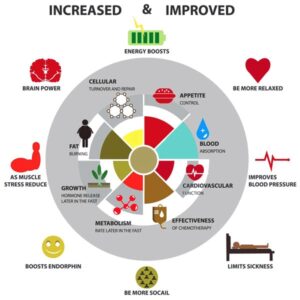Why Do People Exercise? The Ultimate Guide to Its 5 Benefits, 5 Downsides, & Considerations
Exercise is much more than just a way to stay in shape; it’s a powerful tool that enhances every aspect of your life. Regular physical activity provides benefits that go far beyond the obvious improvements in physical health. It sharpens the mind, elevates mood, strengthens social bonds, and lays the foundation for a longer, healthier life. The evidence is overwhelming: those who exercise regularly are not only physically fitter but also mentally sharper and emotionally more resilient.

Not exercising will not make you any worse of a person than someone who does, but it will lead to more health complications. People who go months or longer without forced physical activity tend to get lazy, depressed, and obese. Not only does it slow your overall metabolic rate, being inactive for so long, but it slows your brain activity as well.
🔥 Physical Benefits of Exercise
| Category | Key Benefits |
|---|---|
| 🔥 Physical Health | Builds muscle, burns fat, strengthens heart & bones |
| 🧠 Mental & Emotional | Boosts brain function, reduces stress, improves sleep |
| ⚡ Performance | Increases stamina, coordination, and athletic performance |
| 🩸 Internal Health | Regulates hormones, aids digestion, reduces inflammation |
| 🔥 Lifestyle Benefits | Boosts productivity, libido, and self-discipline |
Exercise is essential for building and maintaining physical health. It directly impacts how we move, feel, and age. Here’s the Physical Benefits of Exercise:
- ✅ Builds Muscle & Strength – Helps with daily tasks, improves posture, and prevents muscle loss.
- ✅ Burns Fat & Aids Weight Loss – Increases metabolism, helping maintain a healthy body fat percentage.
- ✅ Boosts Heart Health – Lowers blood pressure, strengthens the heart, and improves circulation.
- ✅ Strengthens Bones & Joints – Reduces the risk of osteoporosis and arthritis.
- ✅ Increases Stamina & Energy Levels – More endurance means less fatigue in daily life.
- ✅ Improves Flexibility & Mobility – Prevents stiffness and helps with movement efficiency.
- ✅ Reduces Risk of Chronic Diseases – Lowers risk of diabetes, heart disease, and stroke.
- ✅ Enhances Immune Function – Helps the body fight off illness more effectively.
Your heart is at the core of your well-being, and regular exercise is one of the most effective ways to keep it strong and healthy. When you engage in activities like running, cycling, or swimming, your heart pumps more efficiently, and your blood vessels become more flexible. This reduces the risk of cardiovascular diseases such as heart attacks, strokes, and high blood pressure. Exercise lowers bad cholesterol (LDL) and raises good cholesterol (HDL), helping to keep your arteries clear. Even moderate-intensity exercise can make a significant difference, lowering your blood pressure and reducing the strain on your heart. Over time, this leads to a more resilient cardiovascular system that can withstand the challenges of daily life.
Strength training, whether through lifting weights, resistance exercises, or bodyweight movements, is essential for building and maintaining muscle mass. Strong muscles not only improve your physical appearance but also support your joints, reducing the risk of injuries. Moreover, weight-bearing exercises like walking, running, and resistance training are crucial for bone health. They stimulate bone growth, increasing bone density and reducing the risk of osteoporosis as you age. A strong muscular and skeletal system not only enhances your physical abilities but also contributes to better posture and balance, preventing falls and fractures.
In a world where obesity rates are rising, maintaining a healthy weight is more important than ever. Exercise plays a pivotal role in weight management by helping you burn calories and increase your metabolic rate. Whether you're looking to lose weight, maintain your current weight, or simply avoid weight gain, regular physical activity is key. Exercise helps regulate your body's energy balance, making it easier to manage your weight without restrictive diets. The more active you are, the more calories you burn, even at rest. This makes it easier to enjoy a balanced diet without worrying about gaining excess weight.

🧠 Mental & Emotional Benefits
Exercise isn’t just about physical health—it also works wonders for your mind. These mental and emotional benefits are equally crucial:
- 💡 Boosts Brain Function & Memory – Increases blood flow to the brain, improving focus and cognition.
- 💡 Releases Endorphins (Feel-Good Hormones) – Helps reduce stress, anxiety, and depression.
- 💡 Improves Sleep Quality – Helps regulate sleep patterns for deeper, more restful sleep.
- 💡 Increases Self-Confidence & Discipline – Achieving fitness goals builds mental toughness and confidence.

⚡ Performance & Longevity
Exercise is a catalyst for improving performance and increasing longevity. It sharpens physical abilities and supports long-term health:
- 🔹 Improves Athletic Performance – Increases strength, endurance, and agility.
- 🔹 Enhances Coordination & Balance – Reduces fall risk, especially as you age.
- 🔹 Increases Longevity – Active people tend to live longer, healthier lives.
🩸 Hormonal & Internal Health
Physical activity can regulate many internal processes, from hormones to digestion. Here’s how:
- 🔬 Regulates Hormones – Helps balance testosterone, estrogen, insulin, and cortisol.
- 🔬 Aids Digestion & Gut Health – Exercise improves metabolism and digestion.
- 🔬 Reduces Inflammation – Helps combat chronic inflammation that contributes to disease.
🔥 Lifestyle & Everyday Benefits
Exercise doesn’t just impact your physical and mental health. It influences your everyday life in powerful ways:
- 🏆 Increases Productivity & Focus – More energy and mental clarity throughout the day.
- 🏆 Boosts Libido & Sexual Health – Improves blood flow, hormone balance, and stamina.
- 🏆 Teaches Discipline & Goal-Setting – Helps build a strong mindset for other areas of life.
💯 Conclusion
Exercise is a game-changer for overall health and wellness. It benefits every aspect of life—from physical strength to emotional well-being. By incorporating consistent exercise into your routine, you set yourself up for a healthier, happier, and longer life.
❗ Potential Downsides to Exercise
While exercise has numerous benefits, it’s important to recognize that there can be negative effects, especially if not done in balance. Here’s a breakdown of potential risks:
| Category | Common Issues |
|---|---|
| 🛑 Overtraining Risks | Muscle strains, joint pain, chronic fatigue |
| ⚡ Hormonal Stress | Increased cortisol, sleep disruption, lowered immunity |
| 💀 Mental Downsides | Exercise addiction, body dysmorphia, burnout |
| 💪 Nutritional Issues | Nutrient deficiencies, dehydration, increased appetite |
| 📉 Daily Life Impact | Time-consuming, expensive, excessive cravings |
🛑 Overtraining & Injury Risks
- ❌ Muscle Strains & Joint Pain – Poor form or overuse can cause injuries.
- ❌ Increased Risk of Overuse Injuries – Tendonitis, stress fractures, and joint wear from repetitive movement.
- ❌ Delayed Recovery & Chronic Fatigue – Overtraining without proper rest can cause exhaustion.
⚡ Hormonal & Internal Stress
- ❌ Cortisol Overload – Excessive exercise raises cortisol, leading to fat gain, muscle loss, and stress.
- ❌ Disrupted Sleep – Too intense or late workouts can interfere with sleep.
- ❌ Lowered Immunity – Overtraining weakens the immune system, increasing vulnerability to illness.
- ❌ Heart Strain – Extreme cardio or weightlifting can stress the heart.
💀 Mental & Psychological Downsides
- ❌ Exercise Addiction – Obsession with working out can lead to mental burnout.
- ❌ Body Dysmorphia & Self-Esteem Issues – Comparing progress to others can cause anxiety.
- ❌ Burnout & Loss of Motivation – Overtraining can lead to mental fatigue and quitting.
💪 Nutritional & Recovery Issues
- ❌ Nutrient Deficiencies – Insufficient nutrition to support intense training causes muscle loss and fatigue.
- ❌ Risk of Eating Disorders – Over-restricting food or over-exercising to burn calories.
- ❌ Dehydration & Electrolyte Imbalance – Sweating without replenishment can lead to cramps or heart issues.
📉 Negative Effects on Daily Life
- ❌ Time-Consuming – Lengthy routines can interfere with work, social life, or hobbies.
- ❌ Can Be Expensive – Gym memberships, supplements, and equipment can add up.
- ❌ Increased Appetite & Cravings – Over exercising can lead to overeating, affecting fat loss goals.
When Will You See Gym Results?
| Timeframe | Expected Results |
|---|---|
| 🏁 2-4 Weeks | Slight strength increase, better energy levels |
| 💪 4-8 Weeks | Visible muscle tone, improved endurance |
| 🔥 8-12 Weeks | Noticeable fat loss, strength gains |
| 🏆 3-6 Months | Major body changes, muscle growth, definition |
| 🚀 6+ Months | Complete transformation, long-term progress |
💡 Conclusion
Exercise is essential, but it must be approached with balance. Too little exercise leads to weakness and health issues, while too much can cause injuries, burnout, and other downsides. Smart training and adequate recovery maximize benefits with minimal risks.
Trending Articles:
Do you have any questions?




